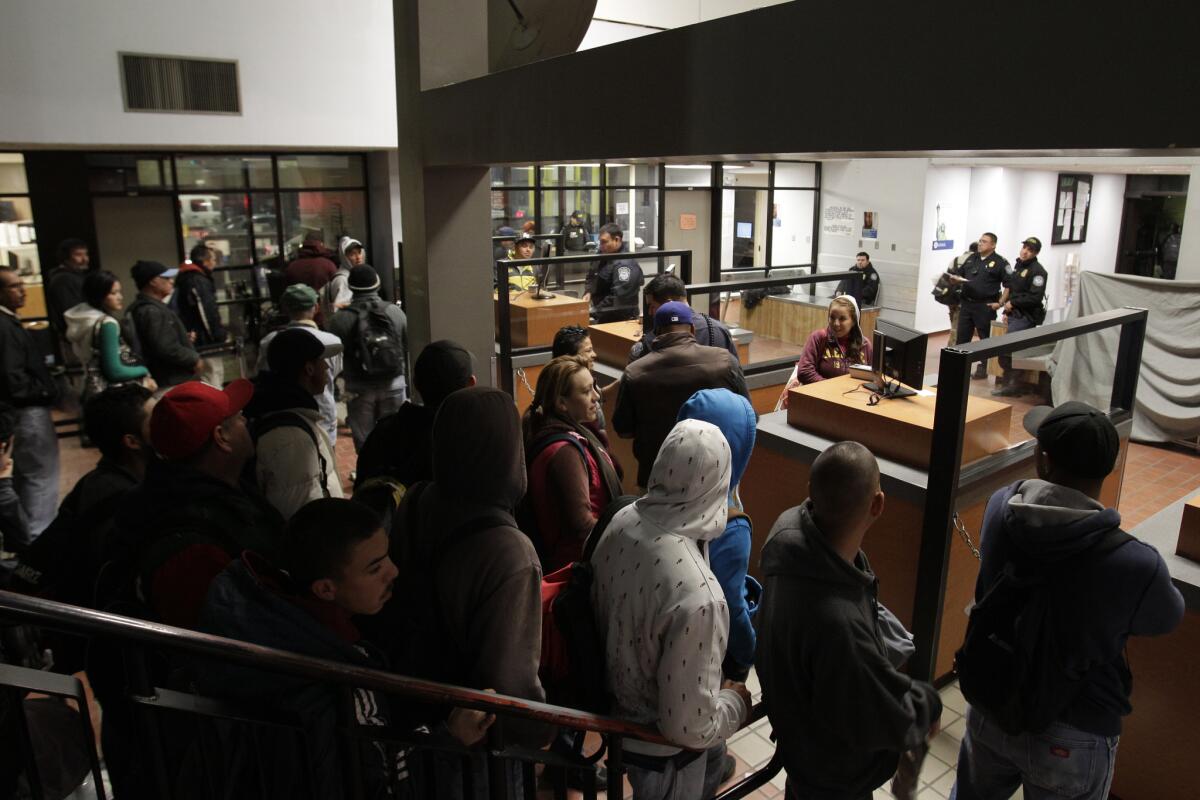Op-Ed: Mexican migrants are heading back home — and that’s bad news for the U.S. economy

People line up to cross into the United States from Mexicali, Mexico before dawn on Feb. 1, 2012. More Mexicans are now leaving the U.S. than coming to the country, according to a Pew Research Center study, marking a reversal to one of the most significant immigration trends in U.S. history.
- Share via
The Pew Research Center released a report this month on Mexican migration to the United States that should give us pause. It did not address Donald Trump’s claims that Mexico is mostly sending violent criminals to the United States; other studies, including a comprehensive report by the National Academy of Sciences, have systematically shown lower crime rates among immigrants than the general population. Instead, the Pew report focused on a phenomenon that most of us have not seen in our lifetimes: net outflow. In lay terms: More Mexican immigrants are leaving the United States than coming to work here.
Immigration to the United States has changed considerably over the last several years, and our policy conversations need to reflect these new realities.
The net outflow of Mexican immigrants follows a decade of “net zero” migration from Mexico, and also includes a significant reduction in unauthorized migration from Mexico. These trends show how dangerously outdated our political conversations about immigration have become. Just three years ago, several Republican governors and presidential candidates were calling for the “self-deportation” of undocumented immigrants. This year, some are calling for mass roundups, forced deportations and a gigantic, no-doubt-costly wall along the southern border. Setting aside humanitarian concerns, such measures amount to fighting old battles.
In Mexico, pressures to migrate have declined over the last decade as fertility rates have dropped and young adults have found more job opportunities at home than were available before. U.S. policies have also played a significant role in contributing to the net outflow of Mexican immigrants. Immigration enforcement and country caps on visas have made it more difficult for Mexican immigrants to bring family members to the United States or to keep them together. Indeed, according to recent surveys in Mexico, the desire for family reunification and immigration enforcement are by far the biggest drivers of Mexican return migration, with lack of job opportunities in the United States playing a considerably smaller role.
While some may cheer the net outflow of Mexican migrants, they should be careful what they wish for. We have long known that a growing U.S. economy depends critically on immigrant workers in various sectors. Mexican immigrants contribute heavily to our state and local economies, especially in construction, agriculture and various service sector jobs. With the wave of baby boom retirements growing each year, demand for immigrant workers will only increase.
Of course, immigration from other countries may pick up the slack for declining migration from Mexico. Indeed, Asian migration to the United States has outpaced migration from Latin America in the last decade, and, more recently, China and India have displaced Mexico as the top sending countries.
Yet there are reasons to be skeptical that Asian migration can substitute for Mexican migration, especially in industries such as construction and agriculture. Most Asian immigrants are considered “high-skilled” and make their way to this country either on employer-sponsored or family-based visas. While the number of undocumented immigrants from Asia has also grown significantly, tripling from half a million in 2000 to more than 1.5 million today, there is little evidence to suggest that these undocumented immigrants are involved in the kinds of jobs that Mexican immigrants are leaving behind.
Immigration to the United States has changed considerably over the last several years, and our policy conversations need to reflect these new realities. Mass migration from Mexico is a thing of the past, while migration from Asia is growing in importance, but the net effects of these changes are not well understood. It is imperative that we pay attention to these new realities and make the necessary policy changes to ensure the continued health of our state and local economies.
Karthick Ramakrishnan is a professor of public policy at UC Riverside and a global fellow at the Wilson Center.
Follow the Opinion section on Twitter @latimesopinion and Facebook
MORE FROM OPINION
Eat, shop, click: Another kind of Black Friday
What fuels Trump’s rise? Anger and fear
The Rev. Andy Bales on skid row and the myths about homelessness
More to Read
A cure for the common opinion
Get thought-provoking perspectives with our weekly newsletter.
You may occasionally receive promotional content from the Los Angeles Times.










